Text
The Future of Television
This week for the viewing journal I watched an interview with Reed Hastings, the CEO of Netflix surrounding the future of television. This is a topic I personally have not put much thought into before watching this interview. Some of the points that Hastings brought up really made me open my eyes to the future of television and even entertainment industries in general. What seemed most obvious to me was the discussion of the future of film and movie theatres. Hastings points out the struggles the movie industry has been going through, the lack of innovation and the lack of new ways to connect to an audience. For me, this is very apparent if one looks at the feature films hitting theatres, many of them are all the same or just don’t really impress you. The film and cinema industry is very much an oligopoly when it comes to who is producing the content and what content gets supported. There is a very apparent lack of new ideas and formats, unlike what we see on streaming sites like Netflix and Crave. Specifically, if I think of what the future of television and the entertainment industries involves, I think of new formats of television shows, new topics, and new ways for audiences to interact with the content. Earlier this year Netflix released Black Mirrors choose your own adventure show called Bandersnatch. This is what I see more as a possibility of the future of television, as Hastings said more and more of television is leaning toward these online streaming platforms, which is scary for cable television and film. What I do think it brings is the opportunity, as Hastings said, to expand into new territories and try things that these larger cable and film companies have not and probably will not try to do.
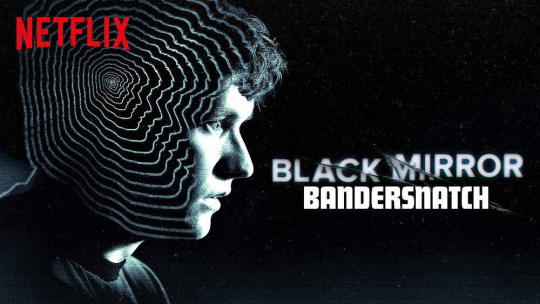
Another large aspect that Hastings brings up is the possibility for a more globalized viewing and appreciation of good television. This is integral to the future of television as it continues to expand the market and expand the types of content we can interact with as viewers. I have a love-hate relationship with the globalization of television, I love the possibility of finding other content with new ideas, formatting, and production style. Yet, being an MIT student, I do also have my concerns about the possibility of information overload. Although an abundance of possibilities for television may sound amazing and wonderful, I also think that it will cause audiences to become even more overwhelmed by what they like in general. I already find my mind spinning while trying to find a new show or movie on Netflix and many times give up altogether. I am not alone in my concern that there is too much television, I looked online and countless articles popped up discussing the fact that television is just overwhelming. Nick Cannata-Bowman in his article, “TV Overload: Is There Too Much to Watch on Television?” he discusses the mass amount of television shows being released in 2015, we can only assume the numbers have skyrocketed in recent years. Discussing the abundance of comic book shows on television he states, “The average viewer is going to feel more overwhelmed than excited, making it difficult to emotionally invest in all of these, plus any other TV shows outside of the comic book realm they may follow as well”. Although we may be overwhelmed by the sheer amount of content on streaming websites, the future of television will definitely be interesting!
0 notes
Text
Redefining the Sitcom
For this week’s viewing, I watched the first season of the very popular UK television show Flowers. It's important to note that I did have some prior knowledge on the show regarding its dark comedic discussion of mental health. I had never actually seen the show but a quick google of the title shows soaring reviews from Google users, of which 96% enjoy the show and it even scored 100% on Rotten Tomatoes. I have never seen a show or film get 100% on Rotten Tomatoes so my expectations were set pretty high. Although dealing with some pretty depressing subjects like broken families, suicide and death the show was hard to hate. I wouldn’t personally say it was my favourite show I have ever watched but I can definitely understand where the love of a show like this comes from.
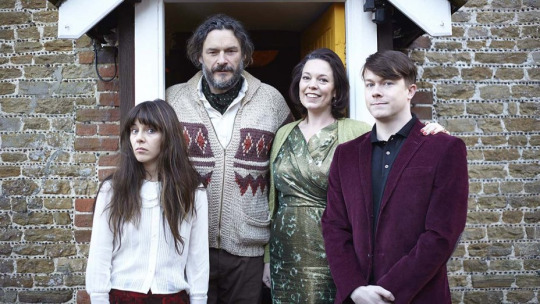
It is pretty well known that television is a form of escapism for many, a way to forget about the horrors and troubles of their own lives. For me, there are usually two main groups of escapism television, the kind where things just seem to go right for the character and you are transported to a utopia of a world where things just seem to work out. Then there are the shows like Flowers that portray such a miserable, overwhelming world that you escape your reality and when you come back your world doesn’t seem all that bad. Flowers portrays this overwhelming lifestyle that has realistic issues and deals with real issues in an extremely dark and exaggerated way. This is why I think the show is so popular, it takes real problems that people can relate to regarding family issues and mental health issues and puts it into popular culture. This helps to normalize the issues surrounding mental health as well as engages with an audience of people who are tired of seeing perfect people in perfect worlds on television.
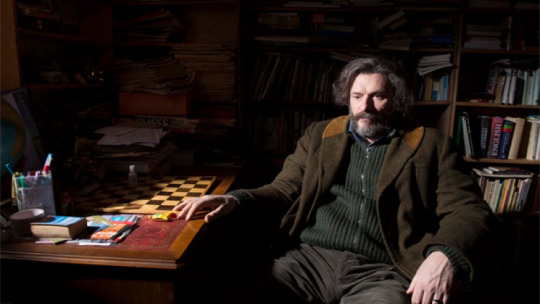
I can’t deny I really enjoyed how the show dealt with real-world issues and how they affect the characters. It seems refreshing to see bad things happen and actually have an effect on characters, they don’t just bounce back like many people on television would. I took a look over some of the articles I had previously read about Flowers and I felt I could really understand the show better after reading them. For example, I read over this article: https://www.theguardian.com/tv-and-radio/2018/jun/08/flowers-mental-health-julian-barratt-channel-4. What stood out the most for me here was the simple statement that flowers is redefining sitcoms. From the sitcoms I previously have watched, specifically the older ones like I Love Lucy and The Mary Tyler Moore Show, I could really see an immense change in content and subject matter. This exposes many of the issues of the time, where these older shows often dealt with women’s rights issues one can see the shift within our culture to more of a concern for broken families, sexuality, and mental health. I think that Flowers does redefine what a sitcom is and shows that they can be dark and dirty like many people’s lives are. They simply can now portray a more realistic lifestyle that many in 2019 can relate to because of the realistic content matter.
0 notes
Text
Changing Views of Gender in Television
For this week’s viewings on gender and sexuality, I watched a couple of older shows including I Love Lucy, The Mary Tyler Moore Show, and All in The Family (I couldn’t get Mohawk Girls to work). These three shows all had different depictions and conflicts surrounding gender and sexuality. Many of these shows and episodes I enjoyed and even watched various episodes of. What I enjoyed is how these shows displayed the changing roles of women in television. The Mary Tyler Moore show was one of the first shows to display a single working woman who lives on her own. This was practically never seen within television up to this point. As well, I know from my past viewing of All In The Family that they were very forward with their discussion of political issues and changes happening within the 70s, including women rights, gay rights, and more. While watching these shows this week, I definitely could appreciate the content within the shows, but I also struggled not to cringe at the content within them.
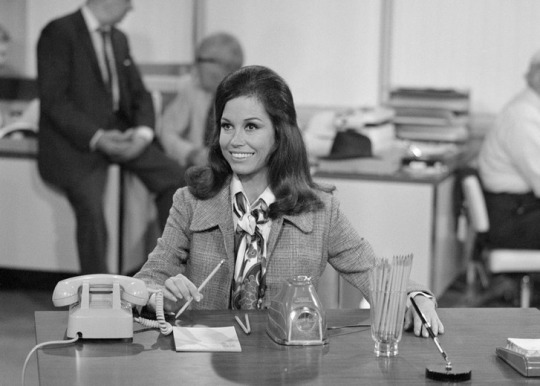
For example, I Love Lucy displayed a completely new look of women during the 50s on television. She is outspoken, she makes decisions, and is not afraid to go against her husband every once in a while. The only issue I had with this show was viewing it from a 2019 perspective Lucy is portrayed as being a silly woman, a woman who doesn’t know anything. She is shown going against the grain but in this episode ends up going back to her “master”. There was a line that really stood out to me as one that doesn’t apply to our world today, it just didn’t translate, “Man is the master and the women does what she is told”. This was the moment within the show where I couldn’t help but sigh a bit, yet I completely understand how this was common within television in the 50s. Even today the stereotype of women being less intelligent and ditsy can still be seen within television, it shows how we haven’t gone that with depictions of women.
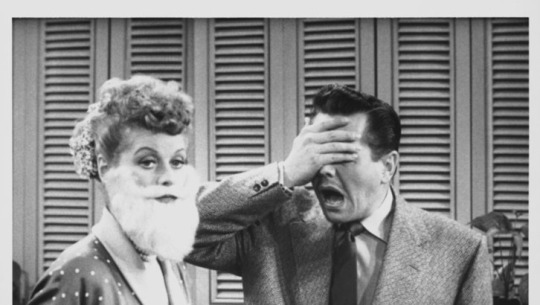
All in The Family portrayed an interesting conflict of gender, but what stood out more for me was the discussion of sexuality. The show displays combatting look at sexual relationships as well as sexuality. The father is straightforward and displays his belief that nothing sexual should happen until the wedding night. The daughter and her husband obviously disagree and are shown making out and trying to have sex before their parents come home. This, to me, was a huge movement within sexuality displayed on television because in the 50s this would be shunned. This also shows how far we have come today in aspects of showing sex and sexuality as more casual, not just something that happens within movies. Along with this, the wife of the show is still displayed as a clown, someone who isn’t as intelligent and that the husband looks down upon. The husband/father also supports a more conventional family dynamic as he says that his daughter and her husband are not allowed to move out until he can support her. The daughter is shown as a weak creature who cannot do things on her own because she is anemic.
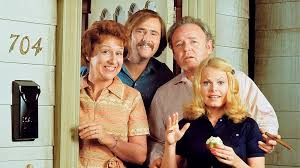
Overall, I can appreciate the impact these shows had on depictions of gender and sexuality within the time periods they were aired. Although some of these shows were harder for me to appreciate all of the content, I can’t deny that they are enjoyable to watch. I also think they properly display conflicting viewpoints of gender and sexuality within the time it was aired. It also shows how the depiction of women being stupid or airheads still is prominent within television today, with pretty women always being dumb or clowns I comparison to men.
0 notes
Text
A respectful and comedic approach to culture.
For this week’s showing surrounded race and class, I watched the beloved Kim’s Convenience and In The Long Run for the first time. Although I enjoyed both, to me Kim’s Convenience really stood out in a more predominant way for me. I will dedicate most of my review to that, but I will say a few words here looking at In The Long Run. In The Long Run for me was a very interesting television show depicting the changing cultural dynamics of an African family in England. In many ways it battled the same cultural differences that Kim’s convenience does while interacting with a European society. I will say that I found all the humour in good taste and it never really took a low blow at African culture. I felt I had less of a connection and understanding of this show because I didn’t grow up in a European society, which is why Kim’s Convenience was so exciting for me. Kim’s Convenience is a super popular show that I believe depicts race in a respectful and humorous way. I find that many shows tackling race and class in the past can be disrespectful and racist in many ways. Kim’s convenience doesn’t play into stereotypes of Korean culture with silly background music and too many references to karate and kung fu which often come with Oriental actors. I believe it gives a more realistic depiction of an immigrant family and how various generations of the family adapt to the Canadian lifestyle. I must say that I may be a little biased because I like the references to Canadian culture.
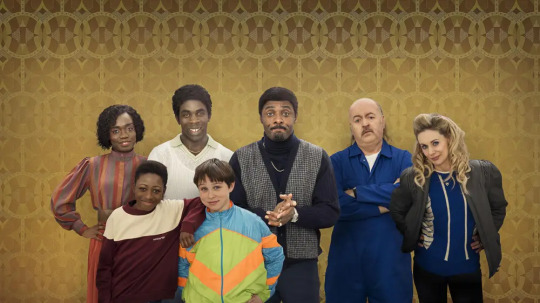
The show provides an image of first-generation immigrant parents adapting to Canadian culture in comparison to their children who were born and grew up in Canada. This is what I find most interesting is how they show the difference in culture and how the parents have adapted well but still, are rooted in a bit of stricter culture. For example, the father has very strict rules within the convenience store. He doesn’t want anyone to help him with the air conditioning, he doesn’t like when people talk too much or run around his store. He is very stubborn in his way’s, but the show does not overdo it and make him seem like a stereotypical insanely strict Korean man. The show also shows the kids in a realistic way, they seem very adaptable to Canadian culture and respect and find the ways their parents act a little silly but understandable at times.
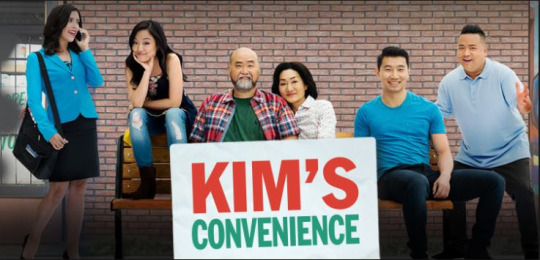
I also think that the show depicts class in an interesting way, although the Kim family isn’t depicted as incredibly impoverished or incredibly rich either. They are seen as a low to a middle-class household that is frugal with money but also not scraping the bottom of the barrel. Although in the first couple episodes they don’t focus incredibly on finances and money the setting and some of the tendencies the family has towards money and the desire to sell things no matter what. Jung, in particular, is shown trying to become assistant manager in a car company to try to pay rent and have food in the fridge. Overall, Kim’s Convenience looks at a Korean immigrant family but doesn’t make it a joke or focus on it too intently. It really just seems like a funny show that is easy to watch and doesn’t provide racist depictions of oriental people.
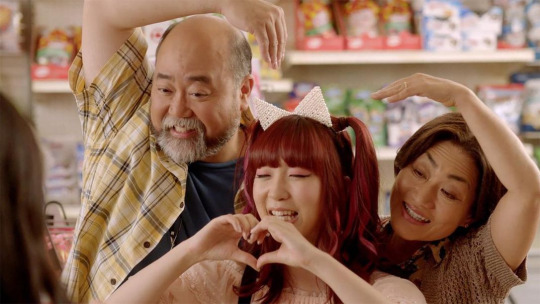
In the end I think that both of these shows are able to look at the humour and more serious issues surrounding cultural changes in new environments. What I found stood out the most for me was the fact that all of the humour was in good taste, the shows never really took a low blow at the culture like many shows today may. Overall I think they depict both class and race in very respectful, yet still humorous ways.
0 notes
Text
For this week’s viewing related to reality television I watched the film Network. This film took an interesting approach and viewpoint to the issues surrounding television and media networks as a whole, not just reality networks. The film painted a more serious and straightforward news network transforming into a place of wild emotions and opinions. To me, this film was really showing the more negative aspects of show business and the effects it has on people in a more reality television kind of way. It felt as though watching it you were seeing a variety of different people reactions and impacts based on what exactly was happening to the main newscaster Howard Beale as he dwindled into insanity.
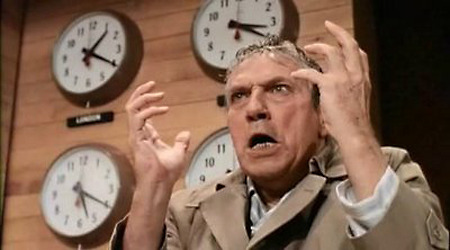
Many reality television shows like The Bachelor and Real Housewives make it quite apparent just how insane the people in the reality program really are, Network adapts this and even emphasizes it in a very blatant way. At the beginning when Howard Beale announced his suicide, it was a shock, but in the essence of reality television, someone having mental health issues is not uncommon. Howard continues to complain about life and how pointless it is and ends up ranting like a lunatic in many scenes. This can be seen prominently in reality television like today, it really is people just complaining and fighting about simple things in life. As Max Schumacher said in the movie “he needs care, not ratings”. This to me, stood out prominently within the film, especially if one has seen the show Unreal. Unreal looks at how the reality television program The Bachelor is produced. They take unstable mentally ill girls and put them on air to make a scene and complain, exactly what Howard Beale does within this film.
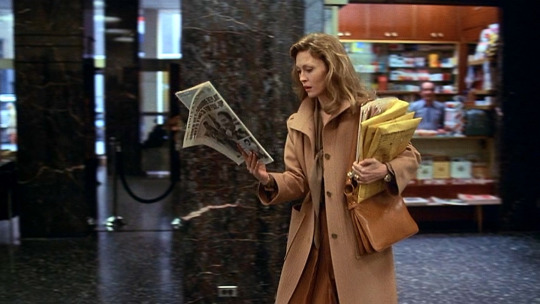
Network also speaks upon the impact television has on our state of reality and how people who grow up watching copious amounts of television are influenced. Max Schumacher states “the only reality she knows comes from the TV set”. One can see how Max is simply saying that we are a product of what we watch, the ads and content that surround us during childhood into adulthood. Television alters our view of reality and what the world should really look like. Reality television is no different as it pitches a world that to some may seem like the dream or realistic when it is highly scripted and manipulated in post-production. That makes one think, what can be considered reality if something is based off a realistic situation and characters, even if it is scripted it may not be that different to the manipulated reality television most of us indulge in. Max references the fact that Diana Christensen’s morals were shaped by shows like Bugs Bunny and classic television shows. What makes Bugs Bunny so different from reality television? It is scripted and highly manipulated by the producers. I think the film even emphasizes how News television is becoming more and more scripted and manipulated by corporate forces to get views and not just give the facts, as a news show should.
0 notes
Text
Cathy Come Home-- Drama or Documentary?
For this week’s viewing of the drama genre, I watched Cathy Come Home done by the BBC. Although it may be considered a drama show I found it utterly unlike any drama I have watched before. Cathy Come Home has no conventions of the dramatic television shows we know of today that keep us on the edge of our seats. When I go into a show or film from the drama genre, I expect something highly produced, with intense close-ups and background music that makes everything seem more intense. That is what I have become used to within television and film today. To me, dramas are supposed to have intense emotion and talk about slightly uncomfortable things in a comfortable way. Cathy Come Home did not encompass this at all. The show or film made me incredibly uncomfortable the whole way through. To be brutally honest it was hard to watch it the whole way through while thinking of it as a drama. In many ways, it seemed much more like a documentary than anything else.
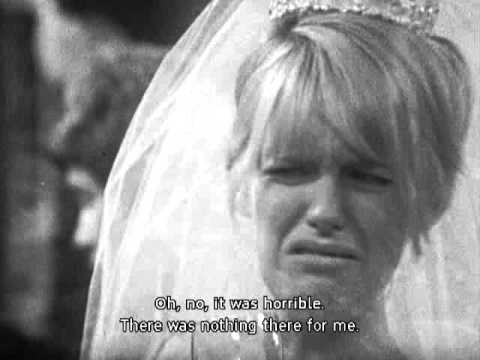
The show produced a classic dramatic love story in the beginning but was hyper-realistic in the slow and dull degrading of a relationship and uncomfortable tears that makes it seem much more like a documentary and less like a drama. Although it was focused on a relationship in a fiction setting at the end it exposed that this situation of mass poverty was happening to many people within the UK. This brought up the question of what does a drama really consist of? For me, I see it as a highly produced emotional story that usually seems to work out for the better in the end. Happy endings flood dramas and allow the audience to endure and forget about the rollercoaster of emotions that are classic in dramas. Cathy Come Home looks at drama in a different way showing the same emotional rollercoaster, with mostly downs and no happy ending, just the uncomfortable truth. In conclusion, I can't say that I enjoyed Cathy Come Home as a drama I see it more as a documentary but that also allows one to expand what exactly a drama consists of.
0 notes
Text
House-- A medical world where everything works out!
This week I watched one of my all-time favourite shows, House. Although I am an avid fan of the series and have watched it through multiple times, I made sure to take a closer look at many of the subject matter which I often ignore while mindlessly watching television. Medical and law enforcement shows are typically known for always being similar, at least in my experience. House is no different having a basic episodic nature with a specific subplot that sometimes changes throughout. You can watch House in any order but underneath the medical plot, there is always a view of the personal lives that to understand you would have to watch the series in order. While watching House this week I really realized just how generic it really is. Every episode consists of a special patient that has an unfixable case that eventually gets fixed, most often before but sometimes after they die.
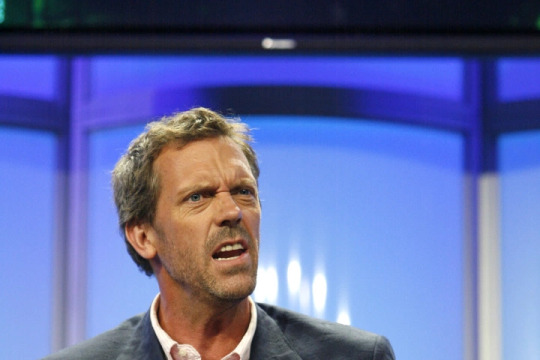
The show House in particular stands apart from other medical shows like Greys Anatomy by incorporating the more ruthless character of the head doctor Dr. Gregory House. Greg is an asshole, to say it lightly. Within his harsh attitude, he plays into the more interesting bad-cop attitude that makes many of our favourite cop shows interesting. Without this negative harsh attitude to show that not all doctors are perfect the show would be simply boring, apart from its hyper-sexualization of the female doctors and administration. Medical shows like house amp up the real-life experience of being a surgeon or doctor with fast-paced background music to add tension and incredibly last-minute diagnosis and treatments. This may be to subconsciously allow the audience to see that even if nobody, for months, has a clue or a treatment for your illness somehow the system will all work out and everything will be okay.
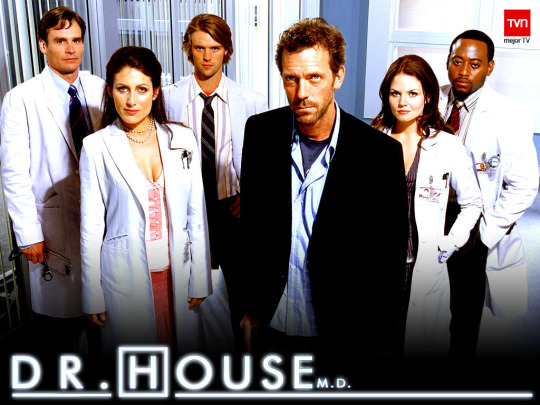
Within the last couple of weeks, we have been looking at politics within television and while watching House I found it interesting how the political and financial side of a medical television show is completely left out. As we all know, America in which the show is set has private health care meaning that in reality, these patients have to pay for the treatment they are getting. This Is ignored by medical shows including House. Patients seem to spend months in hospital with various tests and surgeries happening and then are released back into the world healthy as can be with little to no issues. In reality, I can only assume the financial trauma that follows the sheer amount of time and tests these people went through in hospital. Medical shows, although not abruptly political do tend to portray a system where the good always win and a system that just magically works. The bad guy is caught, or the disease is cured regardless of the emotional or financial trauma these situations would cause. If all of this was incorporated into television, it wouldn’t be quite as entertaining or escapist. It would be plain depressing.
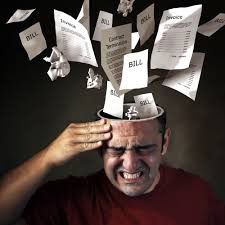
0 notes
Text
The Office-- A Cringe-fest
The Office is an insanely popular cringe-filled comedy show that originated in the UK. To me, it is a show known for its cult following and outrageous characters. When I first watched the American first season of The Office I, like many others, was very intrigued. This show introduced an extremely boring, everyday place of an office and made it funny in an interesting way. Unlike many other comedies that take more lively everyday scenes like a coffee house or a crazy store in New York City, The Office takes place in a dull paper company in a small town. What was even more interesting than the dull setting was the type of humour in fact it used. The lack of a laugh track and taboo humour leaves the viewer uncomfortably intrigued after a joke. Yet in the American version, it always gets a laugh out of me in the end even if fuelled by cringing at the everyday awkward encounters depicted.
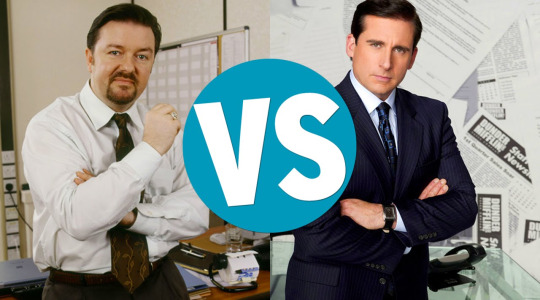
When I watched the original UK version of The Office my view of the show changed dramatically. What I thought was dull or awkward humour in the American version was completely thrown out the window after seeing the UK version. The outrageous characters I knew and loved seemed even duller and even more inappropriately awkward. I rack this up to what I thought was the biggest difference between the two versions of the show, how outrageous the characters are. Michael, in the American version, is completely in your face with his obnoxious and taboo humour. He owns it. His character is so obnoxious it is often hard to watch and hard to believe. This to me is what allows the viewer to know that it is a joke, even throughout the awkward silences.
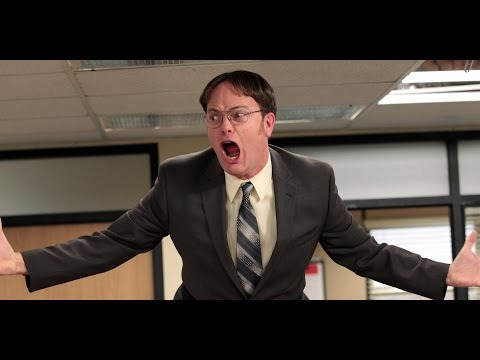
The UK version, for me, completely abandons this as the characters are a little out there but not so much as they seem made up. The issue is that characters like David and Gareth in the UK version are completely plausible. They seem like people you could actually run into.
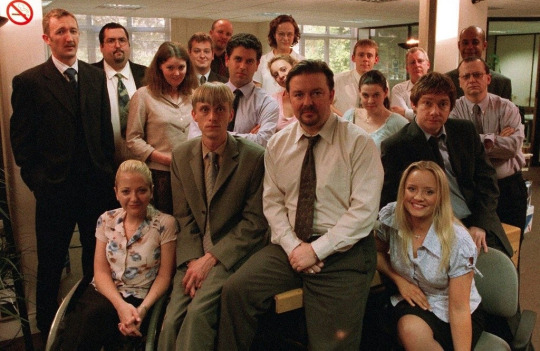
The UK version of the office takes the idea of sitcoms surrounding normal people in normal workplaces to a whole new awkward level. There are hardly any hints at when the characters are being funny and the cringe from the American version seems to only intensify. The UK show takes the mundane everyday life and fills it with people who are trying too hard to be funny within extremely awkward situations. Although all of my review seems inherently negative, I didn’t completely hate the UK version I just found myself having to pause it and take breaks from how intensely awkward and cringe-filled the situations were. For many, this is a wonderful way to escape reality and laugh at others misfortunes in life, for me the cringe is too much.
0 notes
Text
Left of the Dial-- An Honest Bias
Today's media platforms are incredibly dedicated to seeming completely unbiased by their political relationships and personal opinions. As someone who is studying journalism broadcasting, you are told to be completely unbiased and only present the facts. Yet, many media sources today both radio and news seem to subtly input their opinions through banters and the wording of stories and yet don’t allow their audience to know about their bias. Left of the Dial is a documentary that completely flips today's standards of radio media. It displayed radio and news networks that were completely open about their political standings and their opinions on what politically was happening around the world, specifically relating to the Bush presidency. For me, I found this idea at first very shocking as it is not seen often today. The appearance of strictly biased radio broadcasters seems like a breakthrough thing, people can hear both sides of the story with both right-wing and left-wing networks and choose what they rather listen to and believe in. Yet, as one sees in the film being a start-up liberal network in a world of conservative networks had its challenges.
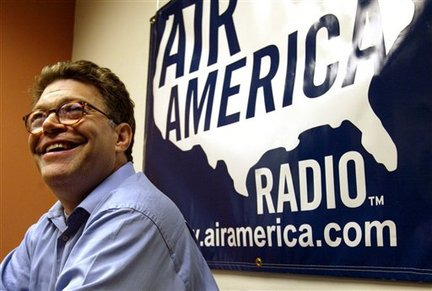
What stood out for me was how much kick back the liberal radio station had from more conservative news networks and other radio shows. I think what happened very much applies to today if you go against the dominant ideas and support of a society surrounding politics you will get kick-back from most people around you. Another interesting factor was how the hosts discussed the impact news networks and radio networks have politically on their listeners, specifically looking at one of the hosts' father. This showed up multiple times throughout the film where she would be talking to her conservative father about the facts of the Bush candidacy. Scandals surrounding torturing that were pinned to the Bush administration seemed completely faulty in the father’s eyes, he refused to believe it even if there was proof. I think this really speaks to the real influence media and politics has on people. They work hand in hand, that’s undeniable and what is told and how it is framed can completely change how someone thinks about a situation or scandal.
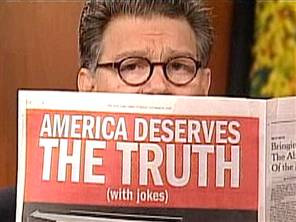
The more I watched Left of the Dial the more I kept questioning how a radio network like this would be taken today. In a society that is extremely delicate surrounding controversial topics a show surrounding controversial liberal opinion seems scary. Yet, through media sources including biased news and radio media, I think the definition and idea of being liberal have completely changed. Instead of the liberals who want to fight for a better world and better candidate for presidency they are seen as the complainers of the world. Bias within the media affects us all even if we don’t realize it, the film Left of the Dial really opens up the possibilities for honest biased media.
0 notes
Text
Politicising Pop-Culture Television
This week I watched the panel discussing the current relationship between politics and popular television. After watching this hour-long segment, I realized how prevalent political television shows have become in pop-culture even though politics itself isn’t that popular. A moment that stood out for me was when they were discussing why audiences seem so excited for television shows like Scandal and The Good Wife. In particular, they started to discuss how audiences are hungry for engagement with politics. They don’t feel a connection with their government and so they look for engagement in other forms, in this case, television shows. For me, I both agree and disagree with this statement. I think that people do have a lack of connection towards their governments and political knowledge and seek forms of engagement with it. The only issue is that shows like Scandal and The Good Wife, in my opinion, these shows may engage their audiences with a political climate, but with a lack of realism. Many of these shows paint a picture of politics that isn’t exactly realistic, and so I don’t necessarily think that viewers are engaging with politics while watching these types of shows. Rather the makers are making politics seem more dramatic and engaging for the audiences and leave out all the boring and realistic parts of politics that viewers could learn from. Apart from the idea that viewers gain engagement with politics while watching they brought up the rise in popularity of politics, especially with youth. They linked the rise in popularity directly to Barack Obama and his campaign. They said that Obama made politics cool to be interested in and engaged with. I can see where they are coming from with this. Even in Canada, many people felt little engagement with their political parties until someone like Justin Trudeau comes along and makes politics seem cool and takes to forms like social media to engage with a youthful audience. I think these shows capitalize off this rise in popularity with politics, especially with youth. Shows like Scandal bring a youthful feel to the political climate by sexualizing it and showing women in power. This was another aspect that I found interesting, the majority of these shows specifically show women in places of power. Something that isn’t always as apparent in politics, particularly American politics especially in today's political climate. In many ways, I think shows like these are a perfect way to escape the reality of political situations in the world right now and focus on a more exciting and less impactful view of government.
0 notes
Text
Women Getting Sexual
Women as a sexual object is a very common role that they play in popular television. The slow-motion scenes just to glorify the sexual presence of a woman on a show or movie is something we have all seen and grown up with. For this week’s viewing, I watched Chewing Gum which features the main character Tracy flipping this common theme. In a cringe-worthy fashion Tracy provides the audience with an image of women as highly sexual and glorifies her boyfriend Connor. Tracy is seen as sex deprived from her highly religious last relationship where she never got any sexual stimulation, and so she has these crazy fantasies that move past what is considered “normal”. What I mean by this is, Tracy has this weird thing with just licking peoples faces, not a super common thing you see on TV but none the less it displays just how sexually driven Tracy is. One thing I especially enjoyed about this show is its mocking of the glorification of the object of sexuality in general. For example, Tracy sees Connor as this crazy handsome, incredibly cool guy that she is obsessed with. Yet, Connor is kind of a loser, he lives with his sex-crazed mother, writes poems for a living, and in episode three is found just sitting in a trash can. Chewing Gum mocks this idea of the sexual object being this woman of perfection, with Connor, a completely underwhelming guy with a good body. This isn’t incredibly far off since most of the time the sexually objectified women don’t often have much to them other than their body.
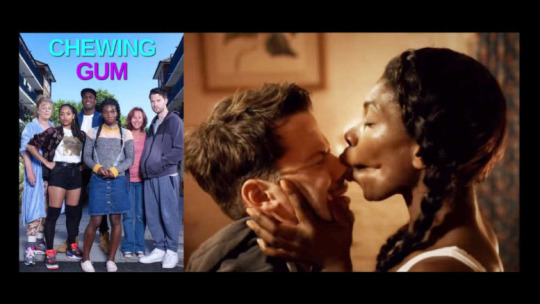
Another character I found extremely interesting was Connor’s mother Mandy, this highly sexual, thief, with absolutely no shame. Mandy is introduced to the show-stealing from Tracy’s convenience store, yet this is not overdramatized. Mandy flips the idea of mothers not being sexual or being sexual in conventual doing their duty to their husband ways on their heads. She is shown signing up for online “dating” profiles, which are more like hook up sights and having some interesting kinks. The character Mandy doesn’t see sex as a big deal which is a huge shift from sitcoms in the past or even to Tracy’s highly religious family that sees sex as a sin. Mandy speaks openly about her kinks and if they are not accepted by the man, she tells him to get into it or get out. The men in her life are not there to be her boyfriend but there to please her sexual desires. They are Mandy’s sexual objects to say it bluntly, she completely flips the common theme of women being the sexual object. In fact, none of the women are dressed in highly sexual attire. There are never really any scanty underwear scenes, usually the women are wearing comfortable bras and underwear or in Mandy’s case a onesie.
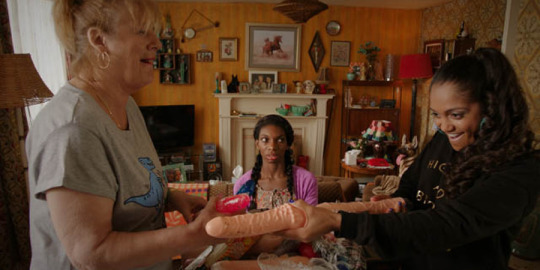
Chewing Gum does a role reversal in many ways through the characters of Tracy and Mandy showing them as highly sexual people who glorify men or just want men, so they can be sexually pleased. I believe both of these characters do a good job of making fun of the common tropes we so commonly accept without considering why the glorified sexual women have nothing to her other than her looks or why women can’t have weird sexual kinks, but men can. Overall This show may have made me cringe through Tracy’s odd interactions with the world, but she does cover some new ground of women’s sexuality on television.
0 notes
Text
A Timeless Escape of Everyday Troubles
For this week viewing, I watched the show Timeless. Timeless focuses on a group of three people, a female professor, an African American programmer and a white military man going back in time in order to save the world. Shows that focus on earlier eras, or in Timeless take us back to huge historic moments in the past have a type of addicting quality while watching. Although I didn’t enjoy Timeless that much due to its intensely cheesy scripting I did find myself interested in what was happening in the historic events they were visiting. Many television shows and movie focus on this and I think it’s a very easy form of escapism for the viewer. Visiting another time really takes away the pressure of the modern era into a simpler time. Even if the show is rooted in complex relations or time travel essence when the characters are in a time with no internet or social media things seem a lot simpler and less hectic. For instance, in Timeless the characters do not concern themselves with low confidence, anxiety or even there phones very much because they begin to live in these past worlds. That’s a rare thing to see in television shows based in 2000, cell phones and technology are everywhere, and many shows discuss the pressures of social media and getting the right job and social movements. Timeless is not completely excluded from that but does show even for the main character Lucy she is shown seeing the pressures of being a single female worker who isn’t completely pleased with her life. Even Lucy escapes all these everyday pressures when going back in time, even if she is trying to save the world somehow this seems simpler for her.
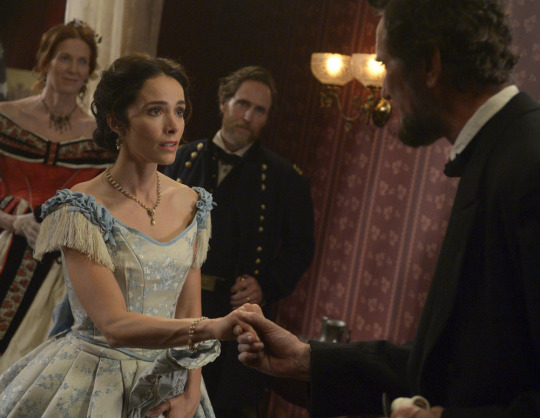
I also think Timeless opens up a nostalgic aspect of the time. The love of history or historic things is evident in Lucy’s enjoyment for the different societal events she gets to see in this time. Even if Lucy doesn’t show joy for being able to wear the fancy dresses of the time as a female viewer I have always wanted to wear one. Even for someone who has no link to the time periods that they are travelling back to there is this sense of awe in how people act and how they dress. Along with this comes the desire to change the past or even see a different future. The entire show of Timeless is hinting at the fact that the evil character, Garcia Flynn, is on a mission to change the past and better the future. I think this is a huge point of recognition or desire for many viewers. The desire to change the past and see a better or different future than what they are living now. You see this in Lucy when her sister is lost she is upset but she also accepts it because other things in her life have changed for the better. Many viewers desire this ability to change the past and have a completely different life. At one-point Lucy even came home from a mission to an incredibly hunky husband who is respectful of her, something many viewers may envy.
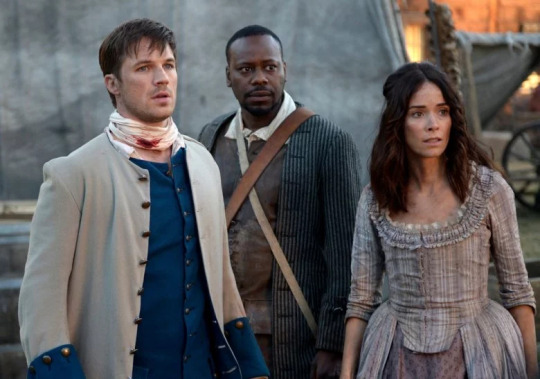
Although I didn’t enjoy Timeless much I can see how the show allows any viewer to escape the troubles of their time and experience something they never had. The characters and the viewers in this show, as well as other time period shows, leave behind their issues, especially as females who deal with sexism, job security, and lack of equal pay into a time period where none of that seems to matter. I will note that it is interesting that not many of the issues of the time were completely understood within the show other than slavery. When Lucy was in the past she had no occurrence of sexism and was still able to be a very independent woman which seems unlikely for the time. She was never talked down to or told what to do by a man. This is just another form of escapism from today's everyday struggles of sexism to a time where it should be very apparent but for some reason, it is not. That is what makes these shows so likable, the old time periods are described without fault and always made exciting, even if the 1930s may have been incredibly boring for most people.
0 notes
Text
The Queen of Evil and Likability
Queen of the South provides an interesting depiction of evil or villainous women. At the beginning of the first episode, Teresa describes men as a drug, her one weakness. It also shows a contrasting image of future Teresa who spearheads a drug empire. This is an interesting combination for a female protagonist who is supposed to dominate a male-dominated world. Her only weakness is men even though she displays conventional male aggression and rules an illegal workforce commonly associated with men. This show is full of evil or even villainous women, even Teresa takes part in conventionally wrong or evil doings, but the most interesting character is Camila.
Camila is an independent woman who embraces her moral classification as a more villainous character but in a very likable way. For many women, it is just nice to see a woman who takes charge, who leaves her husband and runs an empire by herself. The success of a woman without a man or husband in the picture is highly uncommon in television. The show does, however, make Camila more likable to the broader audience as she uses her sexuality and her familial ties to ground her for a wider audience.
Camila is always shown picture perfect, with her hair and makeup was done perfectly and always in a form-fitting wrinkle-free dress. In her appearance, she is the essence of ladylike but she flaunts her looks and her sexuality both to get what she wants but also to make her more likable to the male audience. I think if she was an unattractive woman who ran an empire and was further up on the hierarchy then men she may not have been as well-liked for a male audience. Since she shows off her figure and uses her sexuality she is more appealing for men.
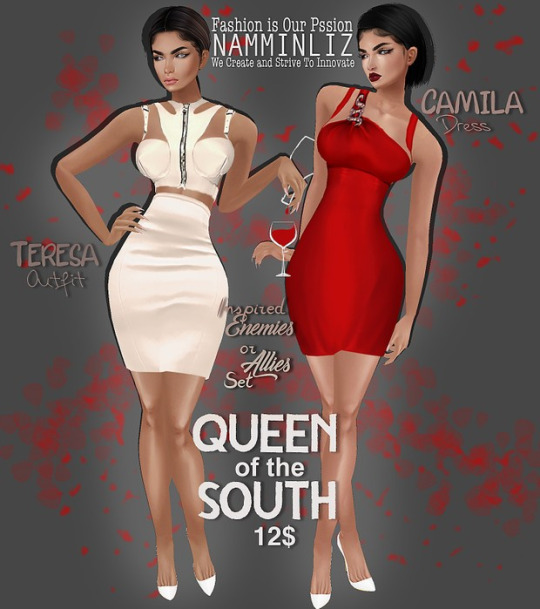
Secondly, Camila is weakened, or made more likable by her familial connections. Even though she imports drugs, kills, and manipulates women the show makes a very big deal by showing her stressed relationship with her husband and daughter. The fact that she has a daughter has no impact of the storyline so far but is inserted into the show in order to feminize Camila. Her concern for her relationship with her daughter brings back more conventionally feminine aspects, making her seem less evil and more approachable.
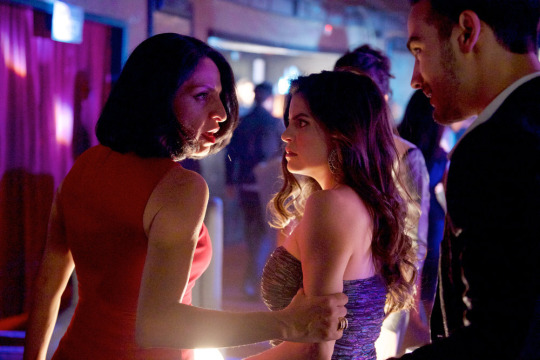
I think Queen of the South shows an interesting depiction of women in illegal business full of evil and villainous acts but makes sure to ground characters like Camila and even Teresa into more conventional depictions of women. They are both shown caring about family relations and children but also, for Camila, she is shown in classic female attire. This is a contradiction that I think exposes what producers and audiences think of women, that they cannot be wholly evil, they must have likable aspects to them even if they are killing and selling cocaine. If you look at Camila’s actions they are despicable and very common to male characters, we have seen on television before. The men in roles like Camila’s are not often made more likable through their sexuality or familial ties, but in their sheer aggression and dominance they are often prized by male audiences.
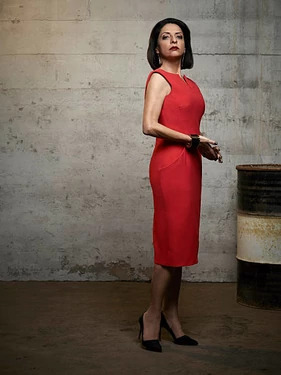
As Camila says, “Women in this business cannot afford to look weak. Don’t make that mistake again”. This speaks not only to the plot of the show but also to women in this industry, if women in television show weakness then they are often seen as not strong enough for television but if they are too aggressive or too strong they won’t be likable enough either. This contrast between likability and strength is prominent not only in Queen of the South but also in the everyday life of women.
0 notes
Text
Women in Comedy
Comedy tends to run male, that’s just a fact. The majority of Netflix specials and people famous and supported for comedy are most commonly straight males. It's also easy to see how a lot of female comedians like Kathy Griffin or Amy Schumer are frowned upon for being overly sexual with their comedy or a little bit too controversial. If you look at male comedy that is exactly what you get. Most of the time, in my experience, you get an hour-long comedy show of offensive hyper-sexual content. Yet when you’re watching it, it doesn’t seem that bad maybe a few jokes make you a little uncomfortable but the internet does not attack the male comedians. I find this is the exact opposite for female comedians with people being disgusted at Amy Schumer for being over sexual and not attractive enough. People say she talks about her sex life too much and yet that is exactly what the majority of male comedians focus on.
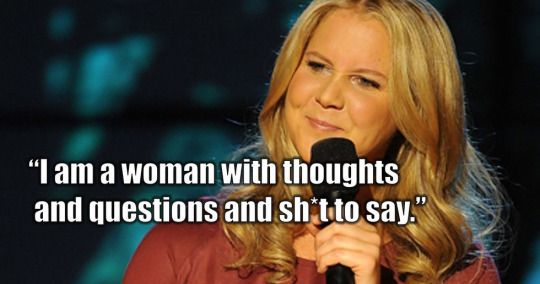
This week I watched the hour-long Netflix original called Nanette with Hannah Gadsby. This was a stand-up comedy show like I have never seen before. She talked about a completely different range of subjects than the usual sex filled stories I find comedy shows are constructed upon. Instead, her sex talk was focused on sexuality and sharing not only jokes about being a more non-binary lesbian woman. One of the first things she brought up that I thought was extremely interesting was this idea of her having to represent her people. Hannah kept bringing up the fact that people always wanted her to represent her people (the lesbian community) and how she tried her best in her comedy shows to do so. I have never heard or seen this complaint in many of the male-dominated comedy, and maybe that’s because they don’t need more representation. Yet, think of Kevin Hart, he isn’t a straight white male and yet he doesn’t talk about his need to represent his people or people’s criticisms that he doesn’t represent the African American people enough. This issue of representation is something I find is most often criticized in female comedians and in this case a female lesbian woman. Not only with Hannah’s case but also with Kathy Griffin they criticize her for being too left-wing or two crude just like Hannah was criticized for not representing the lesbians enough. It's interesting that women are expected to act a certain way or the more proper way in order to properly represent their people even just in comedy. An interesting double standard for women in comedy. To me, it seems like women can’t be funny simply because being funny is seen as too masculine which is why people frown upon female comedians so much The next thing I found was Hannah’s show was a weird mix up of motivational speaking and comedy. For me, I found this a wonderful but also a little uncomfortable, but I think that was the point. Men discuss topics like sexual harassment and beating people up in their comedy all the time, but it doesn’t talk about the issue, instead, it almost makes fun of it. We see comedy as something that has to be constantly funny even if they are talking about serious topics, they must take away the seriousness of it. Hannah steps away from this and discusses these issues male comedians often have as part of the joke, which makes people uncomfortable. They don’t expect to have a comedy show turn from them laughing to them having to face very serious issues within our society. This is where I think a lot of the tension comes from with the idea of women being funny. Men don’t like to see women being over masculine by making jokes about sex and degrading men. Many people also don’t like having to think about real life issues during a comedy show because it is a way to escape from reality for many people. I do believe women can be funny, but I also think Hannah’s movement from comedy as an escape from seriousness to an intense discussion of serious topics makes it hard for people to classify her as funny or a comedian.
0 notes
Text
Romance anyone?
This week we took a look at two different romance focused shows. They were Jane the Virgin and Crazy Ex-Girlfriend. While watching these shows I realized they looked at romance and women from very different perspectives. Although I didn’t initially expect Jane the Virgin to be a more forward-thinking show I was pleasantly surprised. Initially, from the title, I expected a more religious approach to the topic of sex, dodging around harsh topics and focusing on women being in a motherly role. The show took the opposite road on all of those topics, showing a woman who is strong enough in her morals to be upfront about her sexual desires, which is to wait for marriage. Although classically this may have been a very normal thing in today's society I find a lot of television depicts women and girls having sex early specifically to please the man. The idea that if you don’t sleep with a man they will leave you is very prominent in today's media culture and something many girls around 20 really believe. Jane the Virgin coupled the virginity topic with a sexually ambiguous mother who can be looked down on or dumbed down many times in the first episode for her career choice and her teenage pregnancy. This show takes a step towards many of the harsh gender roles and issues that are found in other TV shows. As we learned The Mindy Project was looked down upon for not discussing abortion at all within the show even though she was a gynecologist. Jane the Virgin completely combats this taking a very direct route after her accidental insemination. Her mother, her doctor, and many others say abortion is a choice and if she doesn’t want to go through with it that is her choice. Her boyfriend is able to give insight but, in the end, it is Jane’s decision. Jane’s independence on the decision, as well as her proposal to her boyfriend, completely changed my initial thoughts on the program. I found that it transformed into a more feminist focused episode showing women who can be the one to propose and make their own decisions. Even if Jane is a virgin she supports that with it being her own decision not the influence of heavy biblical callings. On the other side of the spectrum, there is Crazy Ex-Girlfriend a show that knowingly mocks classical representations of women. The series paints the picture of this very intellectual lawyer just being absolutely boy crazy over her summer camp boyfriend from 10 years ago. I found it is important to remember it is making a joke out of these shows and how they depict women or else it will make you roll your eyes more than once. This show embraces the idea of television using the freak show to get views by showing this woman as absolutely crazy, in my eyes. She moves across the country and stalks the so-called “love of her life”, Josh. To me, this is blatantly explaining how many shows portray women this way even if they are in classical roles. I see a direct connection to Ally McBeal, they are both lawyers who many times seem to put men above their careers. The only difference is Crazy Ex-Girlfriend uses comedy with the show in order to allow the audience to laugh and see the terribleness in many female characters on television today that are crazy obsessed with a man.
0 notes
Text
Minorities in The Mindy Project
I originally watched The Mindy Project a couple years ago because I heard it was funny and It was refreshing to see a show with a main character who wasn’t a size 0. This was the point of identification for me simply having a woman with what is considered the average body size on television is a big deal. I chose to re-watch the first couple episodes this week and take a closer look into the highly debated jokes and representation within the show.
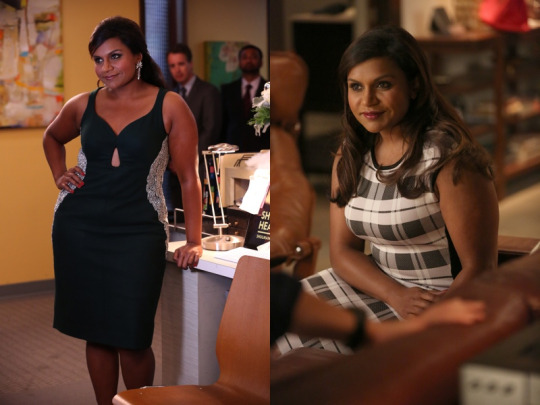
Originally watching the show, I don’t remember being appalled by any of the jokes or question any of the themes within the show. Many of the criticisms of the show relate to the fact that there wasn’t enough diversity through the characters in the show. Re-watching the show I can spot and relate to some of the issues that other viewers had. Specifically, within the first episode they show only a couple women of colour, one of which is, as Mindy describes, an uninsured immigrant who doesn’t speak English. She then goes and complains to her coworkers and a joke is made in reference to her wanting more white clients. When just passively watching the show you may raise an eyebrow at the comment but when actually focused in on the show it seems like an outrageous joke. The only other woman of colour in the episode is depicted in a stereotypical negative way. Mindy frowns upon immigrants and makes a risky joke of looking for more white women, even more commonly depicted women. The show gets its fill of white people in the rest of its casts which is primarily white, in later seasons a stereotypical female black nurse is introduced but continues to do no justice for women of colour.
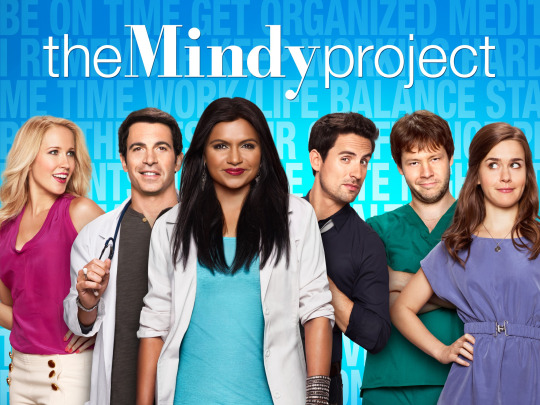
It is hard to say if The Mindy Project is representing minorities briefly and stereotypically on purpose. Is Mindy trying to play fun at conventional sitcoms? Is she trying to speak about how many television shows represent people or is she simply not thinking of any of this? Television most commonly shows fit men and women, who are white and most commonly educated. The Mindy project represents a woman of colour who is not a size zero which is great, but she is also consistently surrounded by people who fit the generic representations in media I described above. Think of her friends in the first episode, young, skinny, mostly white women who are the image of the conventional Hollywood woman. Mindy in herself shows that a non-conventional woman can be the same as any other, she is in a successful business but is also shown playing into conventional women’s roles obsessing over men and what she wears. I think that even though many of her jokes are risky and there isn’t a lot of diversity in the casting Mindy could just be speaking of her experience, or even her mothers experience in being a doctor.
Mindy was on multiple television shows and in the world of entertainment when the majority of people working were white. I think this show could be her quietly talking about how there can be a brown girl in television but still she is surrounded by white, size zero people no matter what, because that is just where the business was.
0 notes
Text
Gossip Girl-- A Post-feminist Picture.
“I don’t read Gossip Girl that’s for chicks”, one of the first lines that Dan Humphrey says in the pilot of the TV drama Gossip Girl. From that one initial phrase, the show encompasses its ability to rely on stereotypical teenage girl attitude and obsession. This show takes a step back from feminist television and more openly focuses on the generic television for women or television for drama driven teenage girls. In many ways Gossip Girl emphasizes the post-feminist views by its casual discussion of sex and money crazed women and teens who use their sexualized oppression, stepping away from female independence and empowerment. A big theme discussed in post-feminist workings is the sexual liberty of women within television shows, how females accept and often embrace being sexualized and degraded by men. An acceptance of the patriarchy and using their sexuality to their own advantage. This is clearly shown within the first couple episodes through the relationship between Blair and her boyfriend. Blair is a virgin and begins to use sex as a way to claim her boyfriend and even keep him interested. When main character Serena comes back to town, Blair automatically takes her boyfriend to her room in order to keep him distracted. This is an interesting shift in television from showing women as more innocent to a post-feminist view of women accepting being sexualized by men and using it to their own advantage. In Laurie Ouellette's article assigned in class, she discusses how the character of Ally McBeal and how she shows post-feminist principles. Ally “obsesses about her appearance and romantic prospects the way feminist activists used to worry about gender inequality—as a sign that feminism was no longer relevant to today’s young women” (1). This can be seen in the majority of female and even some male characters in Gossip Girl, specifically the mothers of Serena and Blair. Although both mothers are pictures as mostly single working adults (Serena's mother has a secret relationship but remains independent in her finances and home life) they are also shown obsessing over class and looks. One of the only times we see Blair’s mother she says to her daughter “You are beautiful, thin, and happy”. To me, this exposes what matters most in these women’s eyes. Beauty and thinness come before being happy in many situations. We see this through female characters like Blair and Dan's sister obsessing over dresses. Blair even spruces up her gym outfit by adding a giant fashion belt which in real life would be unhelpful during athletic situations showing how looks trump what is practical.
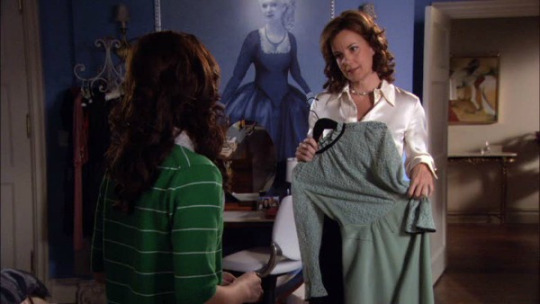
Image: Hooked On Houses/ Gossip Girl show Even if this show portrays some women as independent of men, it does emphasize their ability to use their sexuality for their own benefit. Serena's mother is spotlighted for this with the mention of her countless marriages and divorces which allowed her to get money from her past husbands thus making her financially independent. Yet not by her sheer ability to be a businesswoman but by her ability to marry and divorce men. This and Blairs use of sex as a distraction or a way to get what she wants from her boyfriend shows how the show plays into common post-feminist concepts. It abandons many hyper-independent feminist representations and shows women who accept the patriarchy and use their sexuality for their own benefit and cannot find success on their own but only through another man's wallet like Serena's mother.
1 note
·
View note